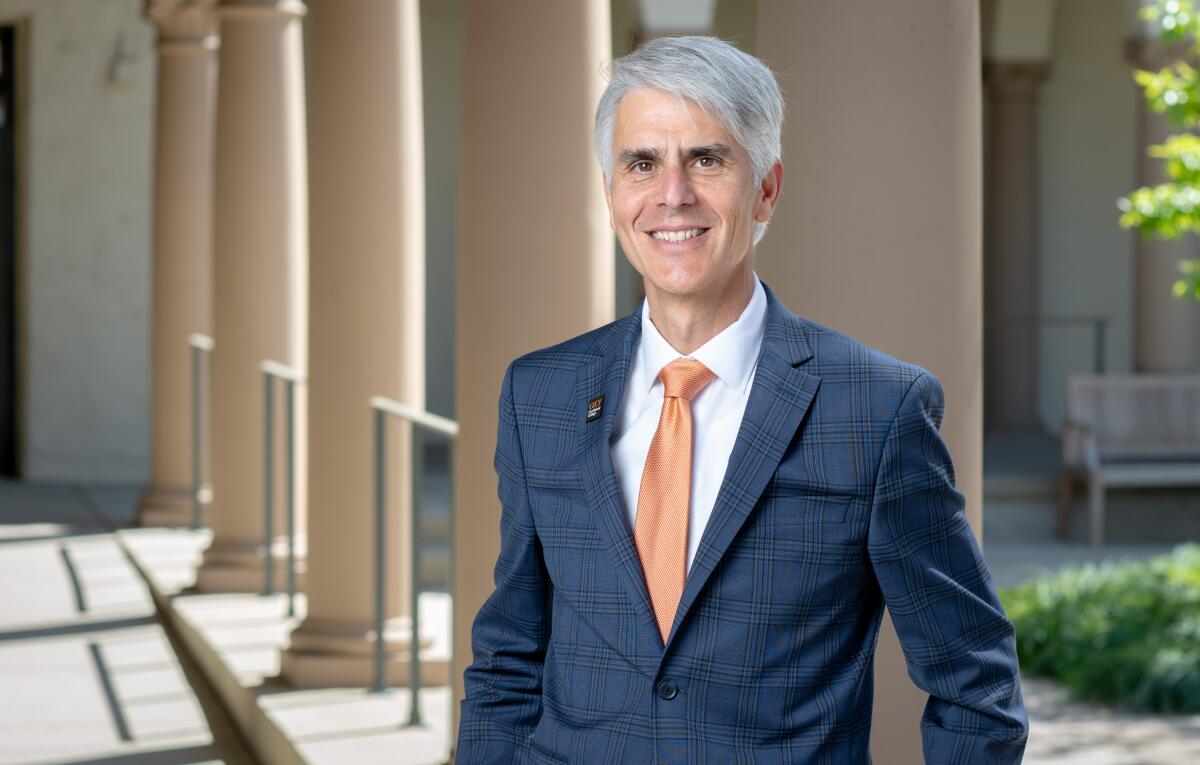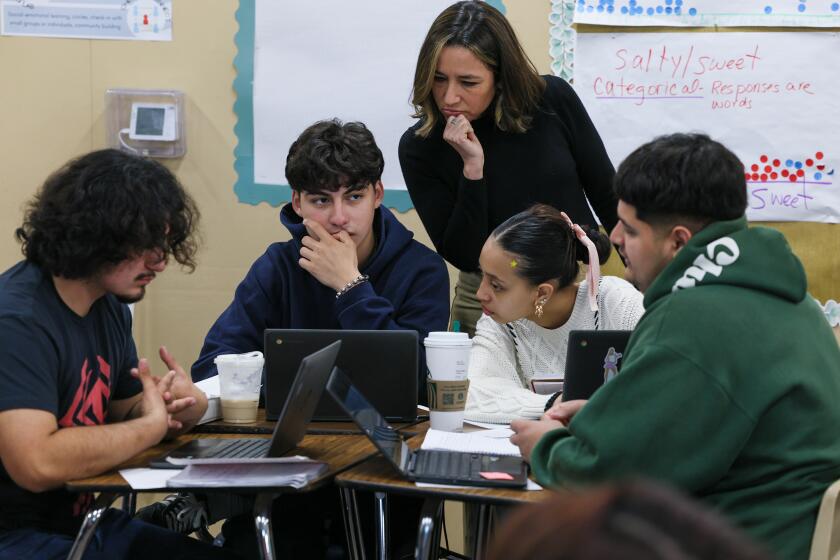New Occidental College president bullish on liberal arts, champion of equity and inclusion

- Share via
A Colorado college leader credited with fundraising prowess, groundbreaking work with Native American communities and decades of higher education experience has been named the Occidental College president, trustees for the Eagle Rock campus announced Tuesday.
Tom Stritikus, president of Fort Lewis College in Colorado, will succeed Harry J. Elam Jr. on July 1 as Occidental’s 17th president. He will take the reins at a time of significant uncertainty for small liberal arts colleges like Occidental, whose recent strategic plan cited challenges with admissions, diversity, financial needs and the lingering effects of the pandemic.
The plan for the college, nestled between the border of Eagle Rock and Highland Park, noted a looming demographic shift with diminishing numbers of college-age students and said “raising our visibility nationally and internationally as the destination for an urban liberal arts experience is paramount.”
College officials said Stritikus, who was unanimously selected, is the right person to take on those challenges.
“Dr. Stritikus’ demonstrated success in creating an inclusive campus environment, bolstering experiential learning, accelerating financial support for the mission and programs at Fort Lewis and being a consistent advocate for students, faculty, and academic excellence speak well to the alignment of his skills and experience with the needs and opportunities in the Occidental community,” Lisa Link, chair of the college’s Board of Trustees, said in a statement.
Stritikus, 54, said he was gratified and thrilled by his selection. “I’m drawn to Oxy because the students who go there want to make a difference in the world,” he said in an interview. “And they are supported by an amazing faculty who bring deep expertise and the skills that I’m convinced our world needs more now than ever.”
He added that he is bullish on the future of liberal arts education, which has faced questions about its relevance at a time of growing demand for science, technology, engineering and math skills.
The University of California is weighing what kind of data science classes could count as math for admission, sparking debate over equity and access.
“The ability for our students to apply what they’re learning to issues in Los Angeles — one of the nation’s most dynamic and important cities — is a huge opportunity to show the world the value of a liberal arts education,” he said. “Given the issues facing our country and our world, there is nothing more valuable than the ability to think critically, to be able to write and to be able to understand and discern what is real information. It is central to the human condition right now.”
The son of Greek immigrants who was the first in his family to attend college, Stritikus is fluent in Spanish and specialized in research on the impact of bilingual education policy on Latino and Asian immigrant communities. He earned his PhD in language, literacy and culture from UC Berkeley and his bachelor’s degree in English from the University of Nebraska-Lincoln.
He got his start in teaching in Baltimore with Teach for America, an educational nonprofit. He served as deputy director of education at the Bill and Melinda Gates Foundation, where he worked on global learning initiatives in Sub-Saharan Africa and South Asia and developed funding plans for initiatives to improve outcomes for low-income students and youth of color nationwide. He also served as dean of the University of Washington’s College of Education.
In coming to Occidental, Stritikus will head a college significantly different from Fort Lewis. The Colorado campus is a rural public institution with a 47% graduation rate, 93% acceptance rate and 3,260 students who are primarily white, Native American and Latino, according to the federal College Scorecard. By contrast, Occidental is an urban private college with an 87% graduation rate, 38% admission rate and a more broadly diverse population of 1,950 students.
But both campuses have grappled with some similar issues — such as challenges over race, identity and social justice. Occidental, like many campuses, has been rocked by fallout over the Israel-Hamas War and, earlier, turbulence over student demands for racial equity.
University of California regents delayed action on a controversial proposal to control political opinion, such as criticism of Israel, from campus websites.
At Fort Lewis, Stritikus led efforts to reckon with the college’s origins as a Native American boarding school, where about 1,100 children and young people were forcibly separated from their families, stripped of their traditions and made to “assimilate.” Some were physically and sexually abused, according to a state report commissioned by legislation championed by Fort Lewis.
Although one Fort Lewis student leader dismissed Stritikus’ efforts, saying Native American students were “not actually valued,” a board member said the president’s evaluations by students, faculty and staff members were “overwhelmingly positive,” according to a local media report.
Stritikus said he was “super proud” of his work with Native American tribes to help reveal the college’s sordid history and also pointed to his work with immigrants and communities of color in the Bay Area and Seattle. He said work on diversity, equity and inclusion, along with expanding student internships and relationships in Los Angeles, were top of mind for him heading to Occidental.
“Ensuring that first-generation students, students of color, find a path to academic success is something that is a through line of my career,” he said. “And that directly draws me to Oxy and a group of faculty who basically coined the term ‘academic excellence and equity.’”
Occidental officials are also looking to ramp up philanthropy, and tapped Stritikus in part for his fundraising skills.
Since taking the helm at Fort Lewis in August 2018, Stritikus said he increased private donations from about $3 million annually to $19 million during the first six months alone of the 2023-2024 fiscal year. He also more than doubled the college’s endowment to $30.2 million, which is far smaller than Occidental’s $604 million.
The fundraising has helped Fort Lewis start a nursing program, create a business school endowment and cover tuition for Colorado residents with family incomes under $70,000.
Elam, Occidental’s current president, announced last August that he would step down June 30 after a four-year tenure due to a recent diagnosis of Parkinson’s disease, a progressive neuro-degenerative illness that affects movement.
In coming weeks, Stritikus said he planned to spend time “listening, learning and doing” after arriving in Los Angeles with his wife, Debbie Pfeifer, and their dog Sky, a “true mutt.” The couple’s twin sons are first-year students at Dartmouth and the University of Richmond.
He added that he’s excited about coming to Los Angeles for another reason.
“I love food,” he said. “I am so excited to eat my way through Los Angeles and I’ve come to the right city for that.”
More to Read
Sign up for Essential California
The most important California stories and recommendations in your inbox every morning.
You may occasionally receive promotional content from the Los Angeles Times.













